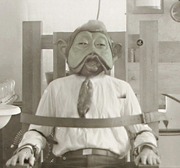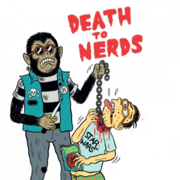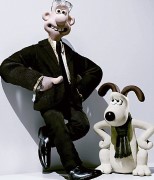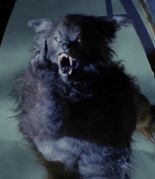|
feedmyleg posted:Dorky as it sounds, it's actually fantastic. It utilizes the text in really poetic and evocative ways, and the whole game is about the inevitability of Ahab's death while players attempt to slaughter as many whales as they can for as much oil as possible before fate catches up with them. Every game ends with Moby Dick killing all the players, leaving Ishmael to go on and tell the tale. I got it in a board game store but their site's here. goddamn it, now I have to buy this drat YE!
|
|
|
|

|
| # ? May 5, 2024 11:11 |
|
weekly font posted:It's you. The person who unironically believes "turning off your brain" is a way to watch movies. If anything my reputation is for delving into movies far more than they deserve. However, you can also get to the center of a maze and realize there's nothing there. You can see the difference this film and Parasite, the film I saw next, in that there's coherency in what people perceived. Now, that's a film that wears its theme on its face, but the shotgun guesses for Lighthouse speak to people having no clue. However, it is unpleasant and monochrome and hard to hear, so it must be very good!
|
|
|
|
Even if the film doesn’t have as obvious a central theme as Parasite and leaves itself more open to interpretation- it’s still gorgeously made and hugely entertaining with two superb performances at its core. It’s a story about two guys going crazy with isolation in a bleak, dangerous environment. That poo poo’s good. It doesn’t have to also be a clear allegory for capitalism or whatever (though individual interpretations can be interesting.)
|
|
|
|
Pick posted:If anything my reputation is for delving into movies far more than they deserve. However, you can also get to the center of a maze and realize there's nothing there. You can see the difference this film and Parasite, the film I saw next, in that there's coherency in what people perceived. Now, that's a film that wears its theme on its face, but the shotgun guesses for Lighthouse speak to people having no clue. However, it is unpleasant and monochrome and hard to hear, so it must be very good! drat ye! Let Neptune strike ye dead Pick! HAAARK! Hark Triton, hark! Bellow, bid our father the Sea King rise from the depths full foul in his fury! Black waves teeming with salt foam to smother this young mouth with pungent slime, to choke ye, engorging your organs til' ye turn blue and bloated with bilge and brine and can scream no more - only when he, crowned in cockle shells with slitherin' tentacle tail and steaming beard take up his fell be-finned arm, his coral-tine trident screeches banshee-like in the tempest and plunges right through yer gullet, bursting ye - a bulging bladder no more, but a blasted bloody film now and nothing for the harpies and the souls of dead sailors to peck and claw and feed upon only to be lapped up and swallowed by the infinite waters of the Dread Emperor himself - forgotten to any man, to any time, forgotten to any god or devil, forgotten even to the sea, for any stuff for part of Pick, even any scantling of your soul is Pick no more, but is now itself the sea!
|
|
|
|
Seriously though your take on this is bad, and you should feel bad.
|
|
|
|
I don't know why some people are so set on this movie having a clear cut message to it. I honestly think looking at it as a puzzle box to be unlocked is the shittiest way you could possibly approach it.
|
|
|
|
The idea that a movie needs a clear message to be good is also insane
|
|
|
|
The message of the movie is two wickies in a lighthouse, vibing, not a cell phone in sight
|
|
|
|
Just a story about two bros hanging out under a table, going to pound town on some lamp fuel
|
|
|
|
A classic Linklatter-style hangout movie.
|
|
|
|
Two bros chillin in a Lighthouse, five feet apart because they're not gay.
|
|
|
|
Pick posted:If anything my reputation is for delving into movies far more than they deserve. However, you can also get to the center of a maze and realize there's nothing there. You can see the difference this film and Parasite, the film I saw next, in that there's coherency in what people perceived. Now, that's a film that wears its theme on its face, but the shotgun guesses for Lighthouse speak to people having no clue. However, it is unpleasant and monochrome and hard to hear, so it must be very good! Well, no, your reputation is being an adult who loses their mind over Bee Movie and Shark Tale because THEY'RE SO BAD GUYS, meanwhile stumping for Trolls or dtv Tinkerbell movies or whatever. But let's stick to what you're doing right now, which is really just charmless contrarianism. You have convinced yourself that "film dilettantes" are just projecting onto a movie that has "nothing to say." Now let's just say that this is true, that everyone is just projecting, and that The Lighthouse is just a black comedy about drunk lighthouse keepers. The problem is that people misreading a film is not inherently indicative of its poor quality; nor is, necessarily, the ability to accurately read the themes of a film, evidence that it is well-made. It is not a personal failing of the film that it viscerally pleased lots of people and did not please you. And even if everyone else is simply misreading a film, that does not mean that you have correctly read it. You need to show your work - whereas, you can only insist that you know "there's nothing there" because you watched the movie and didn't like it. None of this is really about the movie, however, which is indicated by your refusal to actually talk about. This is about your feeling of vindictiveness against the "film dilettantes" who made you think the movie was good. And to the extent that you refuse to actually talk about the movie, you also refuse to actually talk about why you have distilled interpretations of the film - whether ones you've read in the press or in this thread - into "shotgun guesses" that lack "coherency." Again, you need to show your work. Implying that, "I just know intuitively and everyone else is just a pretentious idiot" only makes you seem like, as it were, a dilettante. I'd entreat you to actually go back and read the review that you recommended, because it's dilettantism 101. Again, I'll post this AMAZING excerpt: quote:From a directing standpoint, Eggers traps both actors in an uncomfortable 4:3 aspect ratio to create a square frame for maximum claustrophobia. While such an approach works on occasion — László Nemes hid Holocaust horrors in the Hungarian “Son of Saul” (2015) — it can create a rigid viewing experience that limits peripheral mise-en-scčne possibilities with an intentionally smaller canvas. Notice how Fraley, in the first sentence, explains a possible artistic motivation for shooting a 2019 film in 4:3 - it creates a sense of "claustrophobia." However, in the very next sentence, he criticizes its use here because it "limits peripheral mise-en-scene possibilities." Now, ask yourself, what does this have to do with the motivation to create a sense of claustrophobia, and whether or not it's successful? Why is "peripheral mise-en-scene" relevant? What would its motivation be for being there? Well, you have the answer - because a 'tighter' aspect ratio, to Fraley, makes the film experience "uncomfortable" and "rigid." Almost like it's inducing a sensation of one being trapped, in a very confined space, with a limited freedom of perception. Fraley states that the film is aesthetically claustrophobic, and then docks points from the film's aesthetics for being claustrophobic. The kicker is comparing the film's cinematography unfavorably to Son of Saul, where the claustrophobia apparently works because it "hid Holocaust horrors." There's no coherency to this claim: there is no 'hidden horror' in Son of Saul, it takes place in a loving extermination camp. It's almost like Fraley is just giving "shotgun guesses" as to why he prefers the claustrophobia of Son of Saul to the claustrophobia of The Lighthouse. But that's the essence of dilettantism - the lack of commitment to engaging with a subject critically.
|
|
|
|
A minor thing about that review, but the film is not shot in 4:3 (1.33::1). It is shot at 1.19:1, which was the ratio used with Movietone systems from the 1920s and fits in nicely with the setting and feeling of the movie.
|
|
|
|
Even if The Lighthouse doesn’t have a specific Point you can ...point to, does that invalidate it’s reason to exist? Lynch’s films revel in not having a specific, clear point, but a lot of folks would argue that it still has artistic merit. I think there’s enough space for both films like this and Parasite to exist on their own terms.
|
|
|
|
Franchescanado posted:I've seen it twice now, and there's a big through-line that I picked up on the 2nd viewing that I haven't seen mentioned yet. The topic is a little off-putting, and spoilers some stuff, but I think it's interesting and ties a few loose points together. I agree fully with this. In addition to what you've already said, Thomas uses uses wages as a tool for control. When Winslow asserts that he has cleaned the house, Thomas gets him to back down by threatening his pay. When Thomas takes away Winslow's knife, he destroys it and comments that he'll dock its cost from his salary. After having his advanced be fended off, Thomas retaliates by recommending Winslow should not be reemployed and should not be payed...which is what brings everything to its final violence.
|
|
|
|
The movie is very good
|
|
|
|
K. Waste posted:Well, no, your reputation is being an adult who loses their mind over Bee Movie and Shark Tale because THEY'RE SO BAD GUYS, meanwhile stumping for Trolls or dtv Tinkerbell movies or whatever. Not at all, and I have many posts about other films. I like to get in-depth on family media because it's the only genre of film which is explicitly expected to be didactic, which actually commits people to discussing it in more good faith than many other types of film. If the theme is incomprehensible in a family media film, people are far more comfortable with calling it out--bad filmmaking is more readily addressed. The same is often true of horror as well, where (aside from straight torture-orn, and even then) the audience demands a rationale. You can see this in how people became especially gripped by Get Out and Midsommar, with little if any attention paid to the horrific elements compared to what the film was genuinely attempting to communicate. If a film has communicated a theme, ... Actually, I'm going to whip out this graph:  If a film has communicated a theme to the audience, there will be a cluster of interpretations around that theme. If it's the intended theme, that's the bullseye. Parasite pulled this off, for example. If it's not the intended theme, doesn't matter--it'll just be clustered off-center (e.g. Fahrenheit 451 being about television--not censorship). The interpretations are a function of information communicated to the audience and can be justified more strongly than alternative interpretations (e.g. that Parasite is about rigging dog shows). But if the film hasn't said or communicated anything, guesses will all be all over the map and have an equally credible justifications. That's The Lighthouse. The audience doesn't even seem to have a consensus on what the important plot beats are. It's a mish-mash of visuals that have no significance beyond that they're presented in a way that the audience is attuned, by other, better media, to assume have significance. The audience is trying to fill in the gaps, but that's not clever, it's just a gimmick. As stated, it's the emperor's new clothes. You can have a film that's shot in an unusual aspect ratio with an odd color balance with almost no characters and a very thin plot on no budget and still succeed as a film; A Ghost Story is the movie people think The Lighthouse was. But if my opinion is tainted based on being able to interpret lesser (  ) films, then I'm going to go ahead and say I liked it better when it was Joan's film from Clone High! ) films, then I'm going to go ahead and say I liked it better when it was Joan's film from Clone High! 
Pick fucked around with this message at 18:32 on Nov 17, 2019 |
|
|
|
https://youtu.be/CgZY6h-Z8-4
|
|
|
|
The point of a film isn't to communicate an "intended theme". That's a sensible way to decide which educational video to show to a grade school classroom but not which movie to see or recommend in general.
|
|
|
|
Pick posted:Not at all, and I have many posts about other films. I like to get in-depth on family media because it's the only genre of film which is explicitly expected to be didactic, which actually commits people to discussing it in more good faith than many other types of film. If the theme is incomprehensible in a family media film, people are far more comfortable with calling it out--bad filmmaking is more readily addressed. The same is often true of horror as well, where (aside from straight torture-orn, and even then) the audience demands a rationale. You can see this in how people became especially gripped by Get Out and Midsommar, with little if any attention paid to the horrific elements compared to what the film was genuinely attempting to communicate. Love to use empirical analysis terminology that I don't understand to judge art. The p-value of this script is far too high, imo.
|
|
|
|
Is the sole purpose of any work of art to convey a theme? Seriously I was just entertained as all get out by the basic interplay of these two characters and the increasing wretchedness of their situation. It's simple drama, you've got men pitted against the elements and each other. You've got great performances, cool photography, a very intense atmosphere of isolation and grime and increasing insanity. Does all of this count for nothing because people's readings are too diverse?
|
|
|
|
Ferrinus posted:The point of a film isn't to communicate an "intended theme". That's a sensible way to decide which educational video to show to a grade school classroom but not which movie to see or recommend in general. Even if you do think that's something worth criticizing a film for, this film in particular seems like a poor choice to do that with. I'd expect even the most negative reviews will have picked on its themes of isolationism, hierarchical antagonism, the focus on human beings as physical bodies, etc etc.
|
|
|
|
Pick posted:If a film has communicated a theme, ... Actually, I'm going to whip out this graph: Jesus, you're a dope.
|
|
|
|
A Ghost Story and The Lighthouse both rule and they're nothing alike
|
|
|
|
Quick question, what's the central theme of Pulp Fiction
|
|
|
|
Maxwell Lord posted:Quick question, what's the central theme of Pulp Fiction https://www.youtube.com/watch?v=22u36FOXUQc
|
|
|
|
Maxwell Lord posted:Quick question, what's the central theme of Pulp Fiction If you live by the sword, you die by the sword. The only two central characters to get any kind of happy ending are Jules, who leaves the criminal life of his own accord, and Butch, who's forced out after narrowly escaping death several times; out of the remainder, Vincent gets shot to death on the toilet after refusing Jules' epiphany, Marsellus goes back to his life of violence that he's fairly heavily implied to be miserable in, and Mia is stuck with a violent rear end in a top hat who cripples people for flirting with her (with the one new positive aspect of her life being, again, shot to death on the toilet). Pulp Fiction's kind of a bad example here because it very definitely does have a coherent central theme of "the thug life sucks rear end and the glamor is an illusion."
|
|
|
|
Also like, there's absolutely themes to be inferred from The Lighthouse. Just because some Over The Hedge clown makes some bad faith claims that it's empty doesn't mean they're right. Someone early in the thread wrote a very long, incredibly good dissertation about how it's all about how workers on the same level will eat each other alive in the pursuit of capitalistic gain that was never available to them in the first place.
|
|
|
|
Pick posted:Not at all, and I have many posts about other films. I like to get in-depth on family media because it's the only genre of film which is explicitly expected to be didactic, which actually commits people to discussing it in more good faith than many other types of film. If the theme is incomprehensible in a family media film, people are far more comfortable with calling it out--bad filmmaking is more readily addressed. The same is often true of horror as well, where (aside from straight torture-orn, and even then) the audience demands a rationale. You can see this in how people became especially gripped by Get Out and Midsommar, with little if any attention paid to the horrific elements compared to what the film was genuinely attempting to communicate. I will truly never understand experiencing films this way, it seems like a huge bummer. Just because you can’t find the thread doesn’t mean that the filmmaker has hoodwinked everyone else into thinking they enjoyed the movie.
|
|
|
|
I feel like the movie had farts, but did not have fart jokes. Each one was a small act of dominance and violence. Assuming that all farts are comical is itself childish.
|
|
|
|
boo_radley posted:I feel like the movie had farts, but did not have fart jokes. Each one was a small act of dominance and violence. Assuming that all farts are comical is itself childish. I was honestly a bit let down on the amount based on what I had read about in this thread. Compare this movie to Swiss Army Man and there is simply no comparison in terms of volume, duration, and visible effects on others.
|
|
|
|
The farts need to be considered in light of the context in which they were presented. Yes they were simple farts, short and not over-loud -but what did they smell like? I bet they were really stinky because of all the seafood and dirty rum.feedmyleg posted:Dorky as it sounds, it's actually fantastic. It utilizes the text in really poetic and evocative ways, and the whole game is about the inevitability of Ahab's death while players attempt to slaughter as many whales as they can for as much oil as possible before fate catches up with them. Every game ends with Moby Dick killing all the players, leaving Ishmael to go on and tell the tale. I got it in a board game store but their site's here. I ordered this and got a paypal receipt and no other confirmation. Also the company wont respond to my emails or tweets. Is this part of the game? Some lesson about fatalism and the fact that I will never achieve my goal?
|
|
|
|
I mean, saying this movie has no real plot..isn't wrong. On that criteria, I would actually agree, its not a great movie. Butttttttt as a collection of pretty rad imagery and some killer performances and just an all-around vibe, it's fantastic. It just depends on what you expect from it I guess. I kind of find it refreshing that for once a director just admits that he straight up just had some cool ideas for shots and strung together something out of that. Most of the time, that's the case but then you get smarmy interviews where they play it up as some intellectual exercise that isn't shallow, but actually super profound you guys, promise. Eggers is just like, "yeah, I even ripped off this one painter, cuz it was sick! fight me"
|
|
|
|
The Lighthouse has a much more straightforward plot than Pulp Fiction.
|
|
|
|
pospysyl posted:The Lighthouse has a much more straightforward plot than Pulp Fiction. Go on
|
|
|
|
zer0spunk posted:Go on "Plot" = "the structure and order in which events of a film unfold" Plot of The Lighthouse: Act 1: Arriving at the Lightouse A two man crew arrives at the lighthouse and a two man crew leaves > Winslow works his chores, Thomas spends time with the light, creating contention between the two >Winslow and Thomas get to know each other; Winslow explains his sobriety and how he follows rules, creating contention > Winslow becomes frustrated with how Thomas treats him, Winslow interacts with gulls, Winslow dreams of mermaid > Thomas elaborates on various legends of the sea, folk tales and his last partner Act 2: Calm Before the storm Winslow, frustrated with Thomas, counts down the days left at the light house > Winslow grows restless with sexual frustration > Winslow grows to hate Thomas and becomes paranoid > Winslow suffers from nightmares > Winslow kills the gull Act 3: The Storm Winslow and Thomas drink to the end of their four weeks > Winslow and Thomas suffer hangovers and realize the boat is not coming > The storm begins > Winslow, his alcoholism lubricated with Thomas's rum, begins to mentally deterioate > Thomas becomes more frustrating to be around and also makes more overt passes to Winslow > Winslow and Thomas engage in destructive alcoholism > They run out of rations > Winslow loses the ability to orgasm, compiling his sexual frustration > Winslow tells Thomas of his past > Winslow finds the head > Thomas overtly hits on Winslow, Winslow beats the poo poo out of him > Winslow discovers Thomas has been plotting against him > Winslow buries and kills Thomas > Winslow finally goes to look at the light in the lighthouse. It actually has a lot of plot. For an example of a film about a lighthouse without a plot, here is a film by Jonas Mekas called Cassis: https://www.youtube.com/watch?v=BYTvNwhYZdc
|
|
|
|
On one level, The Lighthouse is plain high concept. "Two lighthouse keepers are trapped on an island together." On a character level, the plot is very simply about Winslow's struggle for recognition from Wake. Wake makes him work hard but constantly demeans him and gaslights him. Eventually, they become more intimate, increasing Winslow's hopes, but the stresses of close confinement and Winslow's growing dependence on liquor tear them apart. When Winslow discovers Wake is going to dock his wages, he snaps and their struggle becomes physical. The dialogue is difficult to understand, to be sure, but it's not that complicated a story. The only really ambiguous part of the plot is the ending. The real meaty challenge of the movie isn't in figuring out what happened, but its significance and the significance of the imagery. Pulp Fiction, on the other hand, isn't high concept at all. Characters appear in wildly disparate contexts, contradicting each other and importing significance across the various plotlines of the story. The sequence and pace of the plot is heavily manipulated. The structure of the movie is just very atypical. Like, it's not immediately clear who the protagonist of the movie is supposed to be.
|
|
|
|
Yeah this is a movie you can easily explain to people. That's one of the things that grabbed me from the trailer, it was a good solid setup for a story. Sure, it goes to pretty weird places, but it does so in an organic way. As the isolation gets worse and the tension rises the characters'- and our- grip on reality fades and we don't know what's what. It never outright states what was real or not in the end, it leaves a lot of questions, and I think interpretations vary specifically because of that, but that's been a valid mode of storytelling for at least several decades now.
|
|
|
|
Alternatively, this movie is so ambiguous I could easily say the movie is all a fever dream of one character (take your pick, Dafoe after his interactions with the "light" or Pattinson after crashing into the rocks) and it would be no less valid. There's enough random intercutting to surreal elements culminating in the final shot to argue whatever you want as the plot. So let me rephrase that, this film has no traditional storytelling in the sense of a plot. It's a very Lynch approach, I'm not knocking that at all. I am saying I could see how someone who came in to see a film with a narrative arc would be disappointed. zer0spunk fucked around with this message at 20:29 on Nov 19, 2019 |
|
|
|

|
| # ? May 5, 2024 11:11 |
|
pospysyl is correct. A quick pull from google:quote:High concept is a story with a unique and concise premise that can be described (see: pitched) in 3 sentences or less. Low concept is a story that puts focus on the world and characters surrounding the plot, instead of the plot itself High concept: Two lighthouse keepers drive each other to violence during a storm. Low concept: A semi-anthology film about various persons involved in crime: hitmen trying to clean a vehicle from an accidental murder, a hired hand forced to entertain his boss's wife only to have her OD on drugs, a boxer meant to take a fall wins his fight and gets a hit placed on his head, an armed robbery at a diner. zer0spunk, it's a pedantic point based on semantics, but you're right in saying that The Lighthouse is a high concept film, but you're slightly misguided in saying it doesn't have a plot. It doesn't have an action-oriented plot with many set-pieces, but the characters absolutely change throughout their interactions in easily defined moments (plot beats). And you're right, high concept films tend to be more open to experimentation, such as referencing old legends, or visual flair, or crazy sound design. The example I keep thinking of is Dazed & Confused. It's high concept, cuz it's just kids getting together to celebrate the last day of school. But it's absolutely full of plot, because it casts a wide net with its characters, many of which have individual plots and character arcs that are fulfilled by the end. zer0spunk posted:So let me rephrase that, this film has no traditional storytelling in the sense of a plot. It's a very Lynch approach, I'm not knocking that at all. I am saying I could see how someone who came in to see a film with a narrative arc would be disappointed. Which absolutely happened with my friend. But he's not one to enjoy things like Eraserhead, which I absolutely love.
|
|
|


























